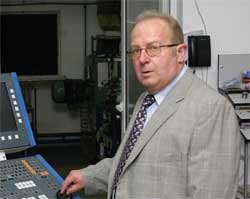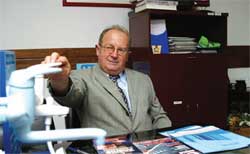Predrag Pešović, inventor and CEO of RPC Pešović - Results are the measure of value
 Thursday, 18.03.2010.
Thursday, 18.03.2010.
 16:44
16:44

No matter how incredible it may sound, the world's authority no.1 in the area of sanitarian innovations (valves, faucets and water batteries) is not working in the research center in Washington, Paris, Beijing or London, but in Šimanovci, a village in the vicinity of Belgrade. The inventor, for the needs of whom the development laboratories of big multinational companies such as GEP, Dupont, BASF, Bayer and others offer free technical support in the development of new products of plastic materials, is not especially known to Serbian public, but he is, definitely, well-known all around the world since he enjoys the reputation of the genius in the circles of experts from the same domain.
He won tens of gold, silver and bronze medals, cups and gran prix awards at the world's most eminent exhibitions of inventions (Brussels, Paris, Moscow, Geneva, Pitsburgh, Varna, Nurnberg...). He is the first laureate of Arhimedes award in Moscow. In addition to numerous earlier patents, which are registered, protected and sold world wide, he can now take pride in patenting a revolutionary technology that enabled, for the first time ever, production of completely plastic (standard and single tap) water batteries.
Although it seems simple, successful adoption of such technology is something that numerous powerful companies have not been able to do over the past few decades (Madgal from Israel, Oras from Finland, Delta from the USA...). In spite of the fact that his previous work brought him significant financial funds and enabled opening of companies in several western countries, as well as construction of a development-business center, Predrag Pešović is of the opinion that the time when his creations will show their real financial value is about to come.
In his development center, the prototypes of products whose existence is going to be revealed soon are waiting hidden behind the screens that protect new ideas from curious glances and cameras of regular visitors from the western companies.
e magazin: When did you discover your talent for technical innovations?
- While still a kid, I was making things that my peers were unable to make. For example, I was making detectors with crystals. That is a small radio receiver whose antenna is placed on a tree, while the device has a winding with crystals in it. I made that when I was seven or eight with the help of my uncle who got me crystals and wires for the winding and bought me pilot headphones in Belgrade.
I used that device to listen to the broadcasts of football games at Radio Belgrade with my school friends, as well as to listen to Radio Bucharest,
which had a very strong signal at the time. Thanks to my uncle, who was both carpenter and wheelwright, I was able to develop my psychomotor functions and perceptivity. I was able, without a drawing, to make a small village car. I made them in the third grade of the primary school and the car had everything a big car has. That love starts in early childhood. When you feel that you are special because of something and that people can notice that, that gives you new strength, a new impulse, and that slowly develops.
em: Can you describe us your life path in short?
- I was born in village Ozrem, in the municipality of Gornji Milanovac, where I finished the primary school. I graduated from the secondary industrial school of precision mechanics in Belgrade. I was not very interested in further education because I got job in Belgrade-based company Precizna Mehanika where I was quickly making progress and earning decently thanks to numerous innovations that I introduced in the technological process. In the late 1960's I spent two years in Germany, in the factory of tanks ad lomotives. Then I returned to Precizna Mehanika and left it for good in 1976. During the next four years I worked in certain private company in Stara Pazova that dealt with production of medical materials (electrodes for ECG instruments). I was making electrodes for electrocardiograms, which were the substitute for imported electrodes, in cooperation with my friend and their quality was that high that Zagreb's RIZ was building them in the instruments it was exporting to the Soviet Union. Finally, in 1980, I opened the development-business center in Šimanovci. All these years I have been additionally developing and equipping that center. It now has about 40 employees, ten of whom are engineers.

em: Why did you decide in mid-1970's to leave the social system of work?
- While working in Precizna Mehanika, I was designing diamond prisms for polishing needles for nozzles, which was something that nobody in the world had at the time because even big companies that produce machines for fine and high-precision drilling, like Studer or Shauff, did not have such good solution to this problem, but mainly made them of hard metal. I wanted to patent my invention because I knew how important it was, but I was not allowed to do that because I was using the factory's resources to make it. As a reward, instead of the promised bigger apartment, I got only six additional salaries, which caused me to turn a leaf. I left the company and moved out from the 2.5-room apartment that I got from the factory to move with my wife, two sons and my mother-in-law into an apartment of 31 square meters. At first, my workshop was a half of the closet in the kitchen.
em: Your Nautilus valve was one of the most famous inventions in SFRY. When did you launch it?
- It was the first valve in the world that could be used unlimited number of times without suffering any damage. It was made in three variants with five generations each. It first appeared in the market in 1985. After buying the license for production, Valjevo-based Krušik was producing Nautilus valve in our country, while the patent was also sold to many countries of Europe. It stayed in the market for about 15 years, and it was then replaced by single-tap faucets. As it is customary, when some product is successful, it is being copied and imitated. The same happened to Nautilus. It even went that far that, for example, one domestic company was producing the valves in China and then imported them from that country to Serbia. After I pressed charges against that company, they lost the case and were forced to pay the fine.
em: Great international success of Nautilus did not cause you to "relax"?
- I did not want to stop. I have always been inventing and creating things... Every man develops in time. I think that the winning mentality that exists within every man represents a sufficient driving power for making new victories. I love to win. I have a winner's halo around my head and I have always been trying to do something that nobody else can at anything I do. I often succeeded in that and that makes me a happy man. The achieved results are the only real measure of someone's value. I often say - if I was born again and if I was not what I am now, I would definitely be very unhappy. While improving Nautilus valve, I was also developing other inventions such as Monsoon pulsing shower, which was declared as the best invention at the Brussels Expo Eureka few years ago, or various massagers, stadium seats, etc. Few people know that the seats on stadiums Marakana, OFK Beograd, Zemun and many other stadiums and sports halls in our country were made in my workshop. Last year we equipped the stadiums in Podgorica and Priština, which only proves that there are no political obstacles to a successful business. I patented most of my inventions and sold them in the markets of the European Union, the USA, Canada, Australia, Israel, China, Japan, South Korea, etc., and almost all of them won prestigious awards at the exhibitions of inventions and got excellent reviews from the expert public. However, I think that the crown of my work is the new technology of production of ecological water taps, which not only avoids the use of heavy metals that are harmful to health, including lead, nickel, zinc or chromium, but also accelerates the production process twenty times, while the achieved quality is so high that it enables issuing of the factory guarantee for the period of 65 months. We are constantly being visited by the delegations of foreign countries (ambassadors, government representatives) and big international companies. Many of them are constantly following and helping our work. The majority of visitors are completely fascinated with what they see here, as well as astonished by the fact that something like this exists at the end of the village road that leads to us.
em: How do you see the future of your profession in Serbia?
- I think it is very good. Our children are very smart, talented and well-educated. Although our country is small, we have had many eminent people and great minds. Our young mathematicians and chess players are achieving very good results all around the world. When it comes to exact sciences, we are more than good. I would like to especially commend the Ministry of Science and Technology for introducing the competition for the best technological innovation in the Republic of Serbia in 2008, which is the base for formation of expert teams from the various fields that will be the carriers of technological development on this territory in the future.
 RPC Pešović Šimanovci
RPC Pešović Šimanovci
 HK Krušik a.d. Valjevo
HK Krušik a.d. Valjevo
 OFK Beograd
OFK Beograd
 Ministarstvo prosvete Republike Srbije
Ministarstvo prosvete Republike Srbije


 Izdanje Srbija
Izdanje Srbija Serbische Ausgabe
Serbische Ausgabe Izdanje BiH
Izdanje BiH Izdanje Crna Gora
Izdanje Crna Gora


 News
News






